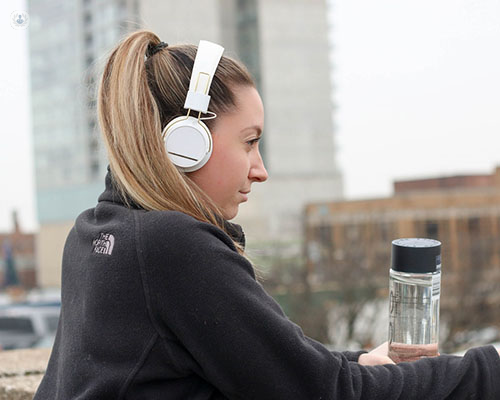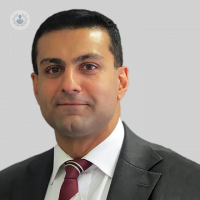How to relieve bloating
Written by:Bloating can leave us with a swollen belly and that “stuffed” feeling, which can be very uncomfortable and painful. The most likely cause is a buildup of gas in response to something that we have eaten or as a response to an infection in the small bowel.
Consultant gastroenterologist Dr Rehan Haidry is an expert when it comes to bloating as he sees many patients in his clinic with the same complaint. Here he shares his advice on how to reduce the discomfort and what triggers to avoid.

Can I do anything to reduce bloating discomfort?
In the short term, it is important to minimise discomfort by taking simple remedies such as antispasmodics such as Buscopan or Colpermin. More holistic approaches such as peppermint and chamomile tea can help. Simethicone drops, which can be bought over the counter can reduce the buildup of gas, cramping and spasm that can occur in response to abdominal distension.
Furthermore, I ask patients to look at triggers within their diet that might be contributing to the buildup of bloating. Lactose intolerance is very common but other dietary products such as gluten and wheat also need to be looked at.
One of the more well-known approaches to managing bloating in patients is the low FODMAP diet, invented in Melbourne in Australia. This is an extremely effective way of reducing the intake of fermentable sugars over a period of time to improve the bloating symptoms then reintroduce them one at a time to see which ones are the trigger foods.
Additionally, I always encourage patients in whom we have found that the SIBO (small intestinal bacterial overgrowth) test is negative, to look at probiotics as there is emerging data now to show the benefit of introducing high-quality probiotics into the small bowel. This has multiple benefits from recolonising the gut with healthy bacteria, improving gut permeability, motility to general wellbeing.
Are there any triggers I should avoid to reduce bloating?
In patients who are diagnosed with SIBO, I have a protocolised way of treating them. The first thing is to avoid triggers. I ask them to look at the FODMAP diet and to reduce the intake of fermentable sugars that can trigger the symptoms.
In patients with hydrogen predominant SIBO, my approach is to treat them with antibiotics. There is a lot of evidence in the scientific community that by taking certain antibiotics such as Refaximin, which is extremely well-absorbed in the small bowel, we can reduce the overgrowth of bacteria that caused fermentation in response to the ingestion of these sugars and reduce symptoms.
It is important not to just concentrate on the antimicrobial therapy but also after this has been completed we have to optimise the environment within the bowel to make sure that there is no recurrence. This involves looking at improving gut motility either with prokinetic drugs, which can be taken pharmaceutically, or more holistically with Iberogast drops.
Also, the introduction of digestive enzymes in acidifying the bowel with hydrochloric acid can help. All of these approaches will not only treat the patient in the short term but also reduce the chances of recurrence of their bloating symptoms.



